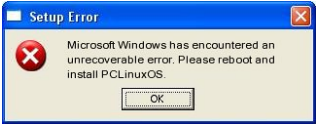| Previous
Page |
PCLinuxOS
Magazine |
PCLinuxOS |
Article List |
Disclaimer |
Next Page |
Alternatives To Dropbox, Part 3 |
|
by Alessandro Ebersol (Agent Smith) 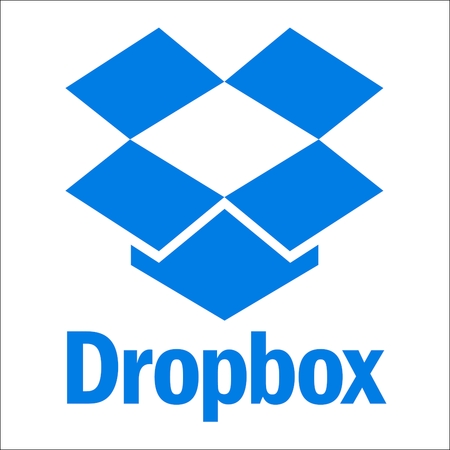 Continuing the series of articles on alternatives to Dropbox, I will present more options to Dropbox. Seafile  Seafile is a file hosting software system. The files are stored on a central server and can be synchronized with personal computers and mobile devices through the Seafile client. Files can also be accessed through the web server interface. Seafile's functionality is similar to other popular services like Dropbox and Google Drive, with the major difference that Seafile is free and open source, allowing users to host their own Seafile servers without limits artificially imposed on storage space or connections from clients. You can deploy Seafile on your own server for free using the Community Edition, which is open source, or choose the Professional Edition, which is free for three users and has an annual subscription for more users. Seafile, however, does not offer free storage. It offers the server software and the client, and from there you set up a self hosted option, like Nextcloud. The community version offers partial functionality, and the pro version offers up to 3 free users. The pro version has annual cost. Seafile Price Options 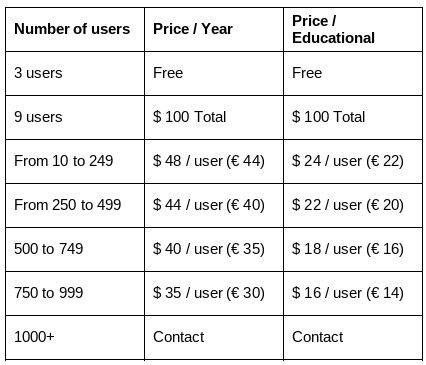 Pros and Cons 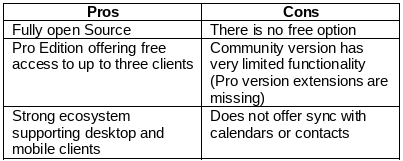
URL: https://www.seafile.com Mega  Mega (styled in capital letters as MEGA) is a cloud storage and file hosting service offered by Mega Limited, a company based in Auckland, NZ. The service is mainly offered through web-based applications. Mega also offers mobile applications for Windows Phone, Android and iOS. Mega is known for its security feature, in which all files are encrypted locally, end-to-end, before being uploaded. This prevents anyone (including Mega Limited employees) from accessing files without knowledge of the password used for encryption. The service was previously noted for its 50GB storage offer for free accounts. However, this was reduced to 15 GB, with additional values only offered on a test basis that expires. Up to 8 TB are available for paid accounts. On January 20, 2018, Mega claimed to have 100 million users registered in more than 245 countries and territories, and over 40 billion files were uploaded to the service. The site and service were launched on January 19, 2013, by Kim Dotcom, who founded the now-defunct Megaupload service. However, in 2015, Kim Dotcom left the service and said the New Zealand government had seized the stocks of a Chinese investor (who is a wanted criminal in China) and has control over the site. Mega Limited replied that the New Zealand authorities did not interfere nor oppose their operations. In 2016, Mega Ltd. released the source code for its client-side software under the Mega Limited code review license, a software license available from GitHub. Features In addition to the storage features, Mega offers some extra features. Namely: MegaChat In February 2013, Dotcom revealed that Mega would expand its services to e-mail, chat, voice, video and mobile. In December 2014, he revealed that his company "would soon" launch a browser-based chat service. In mid-January 2015, Mega launched MegaChat in beta, marketed as an encrypted web-based alternative to applications such as Skype and FaceTime. Browser Extension Mega has launched a plug-in extension called MEGA Chrome Extension in 2015. It has been announced as a feature to reduce download time, improve download performance and strengthen security. Mega also released a browser extension for Firefox. On September 5, 2018, it was reported that the extension in the Chrome Webstore was compromised by the addition of code created to steal credentials from websites and crypto-coins. The original code on the Github page was not affected. Pros and Cons 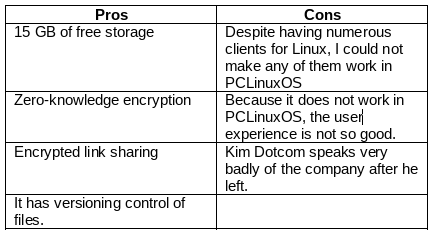
URL: https://mega.nz/ Spider Oak  SpiderOak is a US-based collaboration tool, an online backup and file hosting service that allows users to access, synchronize and share, using a cloud-based server offered by a company with the same name. SpiderOak is accessible through an application for Windows, Mac and Linux computer platforms and Android mobile platforms, Maemo N900 and iOS. According to SpiderOak, the software uses encrypted cloud storage and encryption key creation on the client side so that SpiderOak employees can not access user information. SpiderOak distinguishes itself from its competition in providing encryption, provisioning for synchronization of files and folders across multiple devices, and automatic data deduplication. The key to the Spideroak model is the idea that you have the key to encryption. (Do not lose your keys, use a password manager like Bitwarden to generate and remember. The passwords are generated locally and then used to encrypt the files) Spideroak's competitors in this field are companies that have a "Zero Knowledge" architecture (they do not know / can not know what the users' files are) therefore, can not be forced to hand them to authorities / lose them. Some components of SpiderOak are open source and, as early as 2009, the company announced its intention that the client be fully open-source in the future. Starting in 2016, the SpiderOak ONE source code was made available only to mobile platforms, with no current plans to open the desktop client source code. The SpiderOak password manager, Encryptr, is open source; the source code of their group messaging application, Semaphor, is published to allow auditing. In an interview in July 2014, former NSA contractor Edward Snowden recommended SpiderOak over Dropbox, citing its best protection against government surveillance.Main Features
Pros and Cons 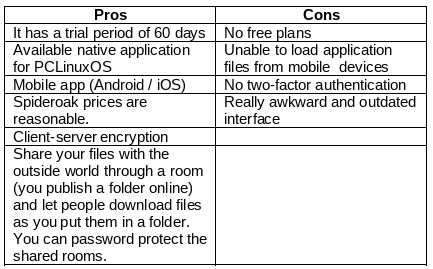
URL: https://spideroak.com Next month, we will have an analysis of all of the options showed, and which ones are the best. |




